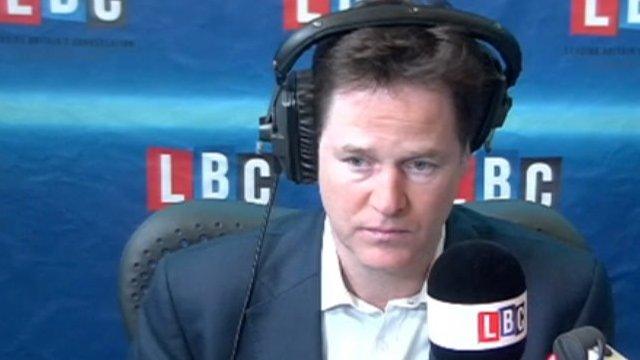Clegg 'shocked' by Farage's stance on Ukraine
- Published
- comments
The issue of immigration sparked a fiery exchange between Mr Clegg and Mr Farage - Courtesy LBC/Global TV
Lib Dem leader Nick Clegg has gone on the attack following his EU debate with Nigel Farage, accusing the UKIP leader of "siding with Putin" on Ukraine.
At the end of their hour-long clash, Mr Farage said the EU had "blood on its hands" for encouraging revolution.
Mr Clegg, speaking on his weekly LBC radio show, said he was "shocked" by the UKIP leader's words, which he would raise at the pair's next debate.
A YouGov/Sun poll suggested Mr Farage won their first clash by 57% to 36%.
Mr Farage will get a chance to react to the debate on Friday, when he takes part in an LBC phone-in - and the pair will stage another debate on whether Britain should stay in the EU on 2 April, which will be shown on BBC Two.
Most newspapers declared the UKIP leader the winner of the first round, taking their cue from the YouGov poll:
The Times said the margin of the UKIP leader's victory was "convincing"
"Instant poll says feisty Farage beat cool Clegg," said the Guardian,, external but accused the UKIP leader of trading in "polemic and distorted facts"
The Telegraph said, external both men would be satisfied with the event, which had "whetted the appetite for similar televised clashes in the general election campaign next year"
But Mark Wallace, writing on Conservative Home, external, said it could establish a precedent for "Second Division" political debates, adding "might Cameron and Miliband be able to do a head to head First Division debate next year?"
The Daily Mail, external declared: "First blood to Farage"
The Sun said: "Nigel fries Clegg for breakfast - he wins TV debate"
Liberal Democrat leader Mr Clegg and Mr Farage avoided personal attacks during their debate, trading blows over statistics instead - and the likely impact on the economy of Britain leaving the EU.
The UKIP leader rubbished his rival's claim that quitting the EU would cost three million jobs, saying it was based on out-of-date, discredited research, and Mr Clegg disputed the UKIP man's claim that 75% of Britain's laws were made in Brussels, suggesting Mr Farage had made the figure up.
They also clashed over who was telling the truth about EU immigration and Mr Farage's claim that 29 million Romanians and Bulgarians have the right to come to the UK.
The impact of an EU exit on Britain's standing in the world also provoked fiery exchanges.
Asked why countries like Ukraine was keen to build closer ties with the EU, which he had described as a "failed" institution, Mr Farage said: "We should hang our heads in shame.
Mr Clegg and Mr Farage each had one minute to set out their position as the debate began - Courtesy LBC/Global TV
"The British government has actually geed up the EU to pursue effectively an imperialist, expansionist - and even Mr Barroso the commission president once said we are building an empire.
"We have given a false series of hopes to a group of people in the western Ukraine. So geed up were they that they actually toppled their own elected leader.
"That provoked Mr Putin. I think the EU frankly does have blood on its hands in the Ukraine. And I don't want a European army, navy, air force or a European foreign policy. It has not been a thing for good in the Ukraine."
Reacting to the comments on LBC, Mr Clegg said he was "extraordinarily surprised and shocked to find he (Mr Farage) agrees with Vladimir Putin".
He said it was "insulting" to people in Kiev who were "simply standing up for values that we should share and support, of democracy, of autonomy".
"It shows quite how extreme people can be, like Nigel Farage, when their loathing of the European Union becomes so all-consuming that they even end up siding with Vladimir Putin," he added.
The issue of human rights legislation and its impact on the UK divided the leaders - Courtesy LBC/Global TV
But former UKIP leader Lord Pearson said Mr Farage was "justified in what he said", adding: "It is the EU's territorial ambitions which led them to offer the Ukraine an association agreement."
Former Lib Dem leader Lord Ashdown said Mr Farage had shown "inexperience" in world affairs, but praised the UKIP leader for debating "at the highest level" with "passion and confidence".
He said Mr Farage, Nick Clegg and the public had all been the winners after their first televised EU debate, and the two "unequivocal losers", were the Conservatives and Labour who were "too divided" to turn up and argue their case.
In his opening remarks on Wednesday evening, Mr Clegg said "a Britain that leads in the world by standing tall in our own European backyard, a Britain prepared to work with other countries on the things we can't possibly sort out on our own."
He added: "We are better off in Europe - richer, stronger, safer - and that's why I will fight to keep us in, for the sake of jobs, for the sake of our clout in the world, for the sake of Britain."
But Mr Farage replied: "This debate is between a tired status quo defending a crumbling EU that frankly isn't working any more, and a fresh approach that says let's be friendly with Europe, let's trade with Europe, but let's not be governed by their institutions."
Anna Soubry: "The real question is who can deliver what I think the British public want and what they want is the opportunity to have a referendum. "
Prime Minister David Cameron, who has promised an in-out referendum if the Conservatives win the next election and Labour leader Ed Miliband, who says he will only sanction a referendum if further powers are handed to Brussels, have opted not to take part in the debates.
Conservative minister Anna Soubry said Mr Cameron's decision not to take part was "not really of any relevance at all" and "the real question" was who could deliver a referendum.
A Downing Street spokesman said Mr Cameron did not watch the debate because he had been travelling back to Number 10 after a meeting with the Queen as it began, but he had caught up with it later on TV news bulletins.
Jonathan Ashworth, Labour shadow minister: "Is it the big issue on people's minds? I don't know"
Labour's shadow Cabinet Office minister Jon Ashworth said it had been an "amusing" debate but did not mean much to ordinary voters worried about the cost of living.
For the Scottish National Party, MSP Aileen McLeod said: "Scotland's always been much more pro-European than other parts of the UK
"Our interests are best served by being part and parcel of the EU."
Plaid Cymru's Leanne Wood said the two men were "not really focussing on Wales's interests, and Wales's part in this debate".
- Published26 March 2014
- Published26 March 2014
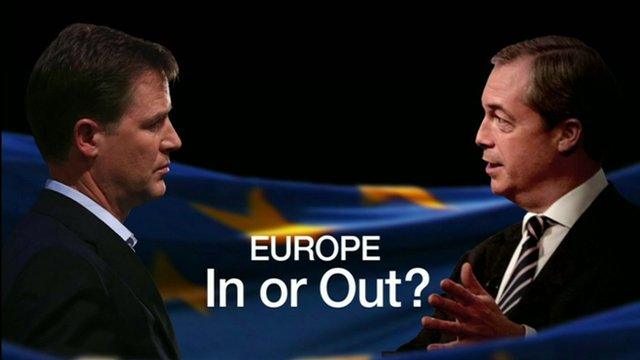
- Published26 March 2014
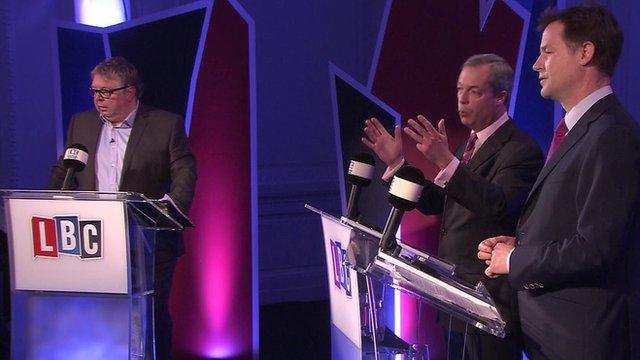
- Published26 March 2014
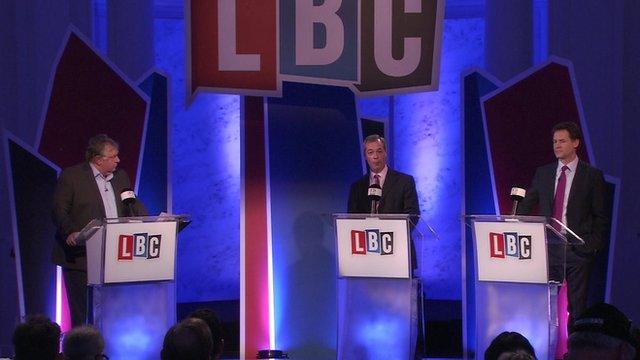
- Published26 March 2014
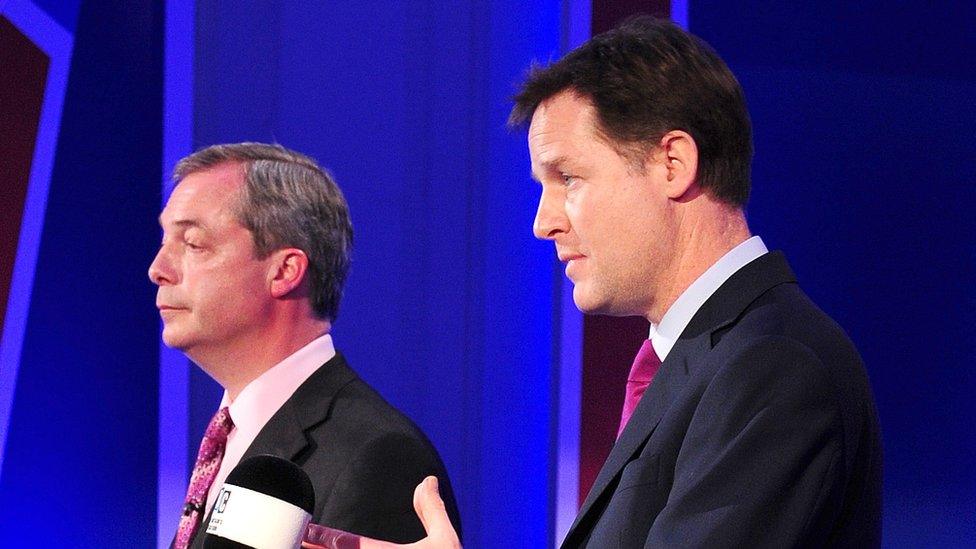
- Published26 March 2014
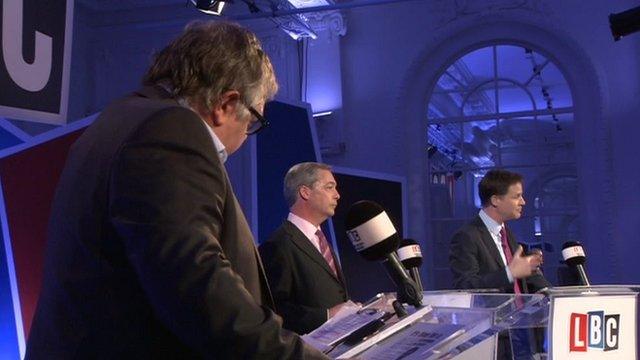
- Published26 March 2014
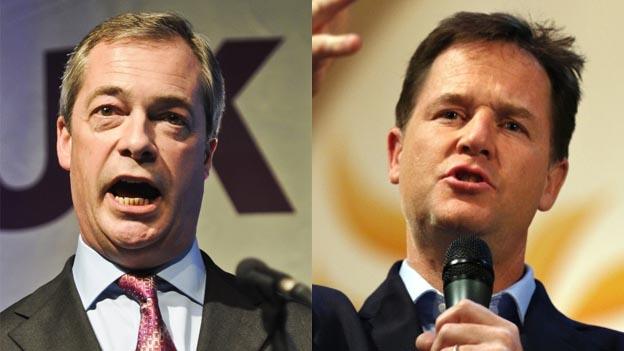
- Published5 March 2014
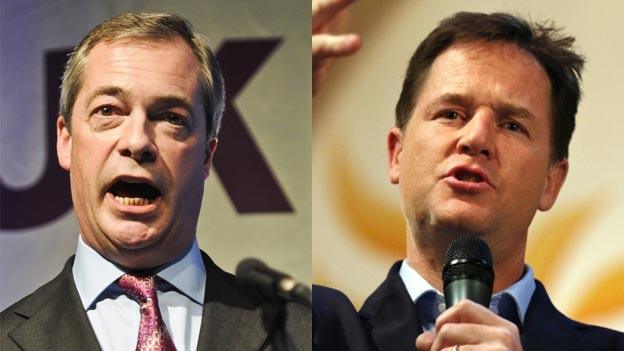
- Published23 February 2014
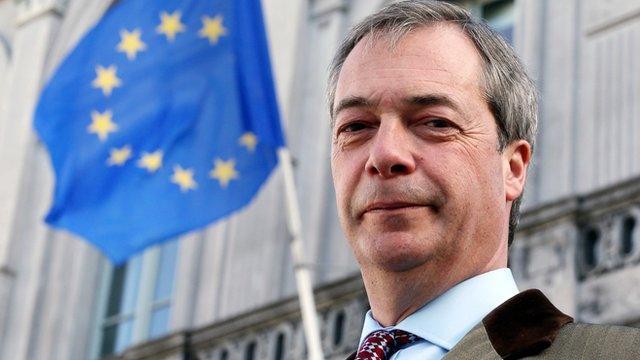
- Published20 February 2014
